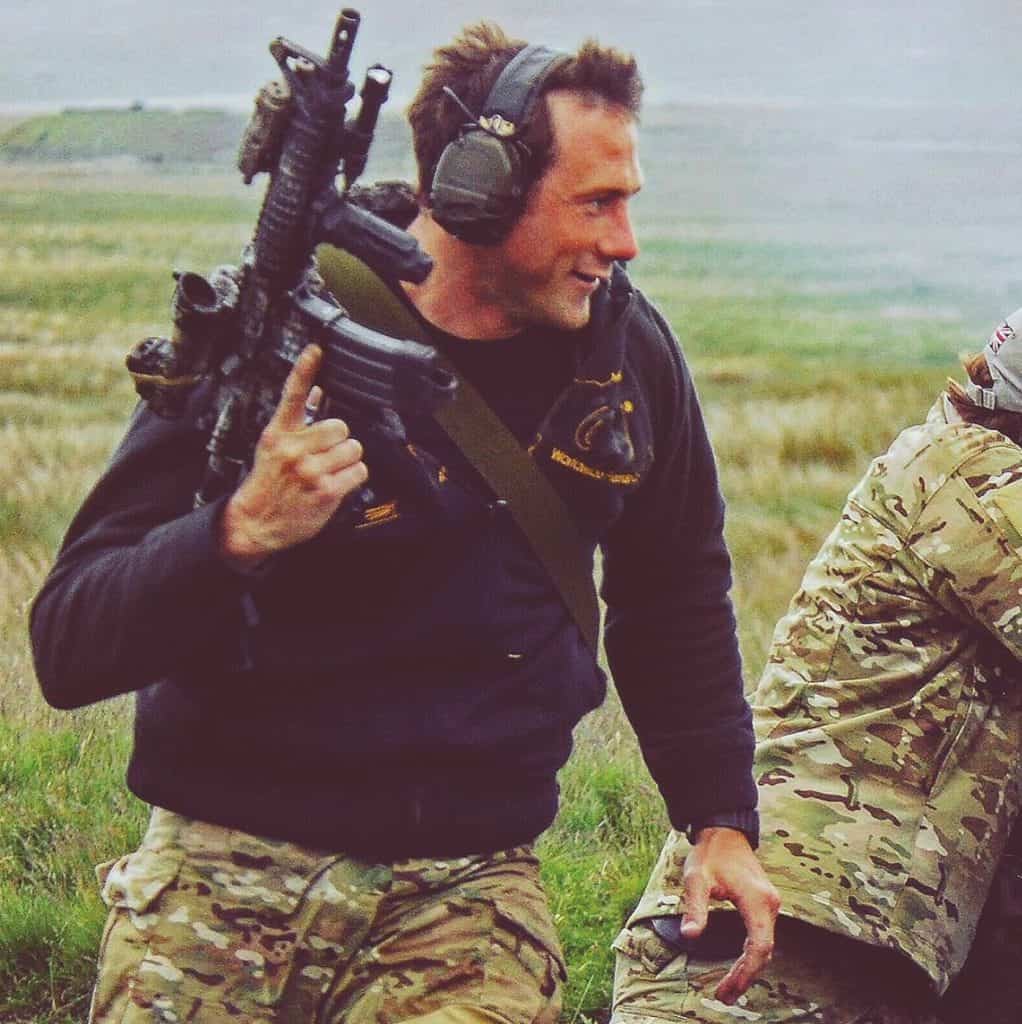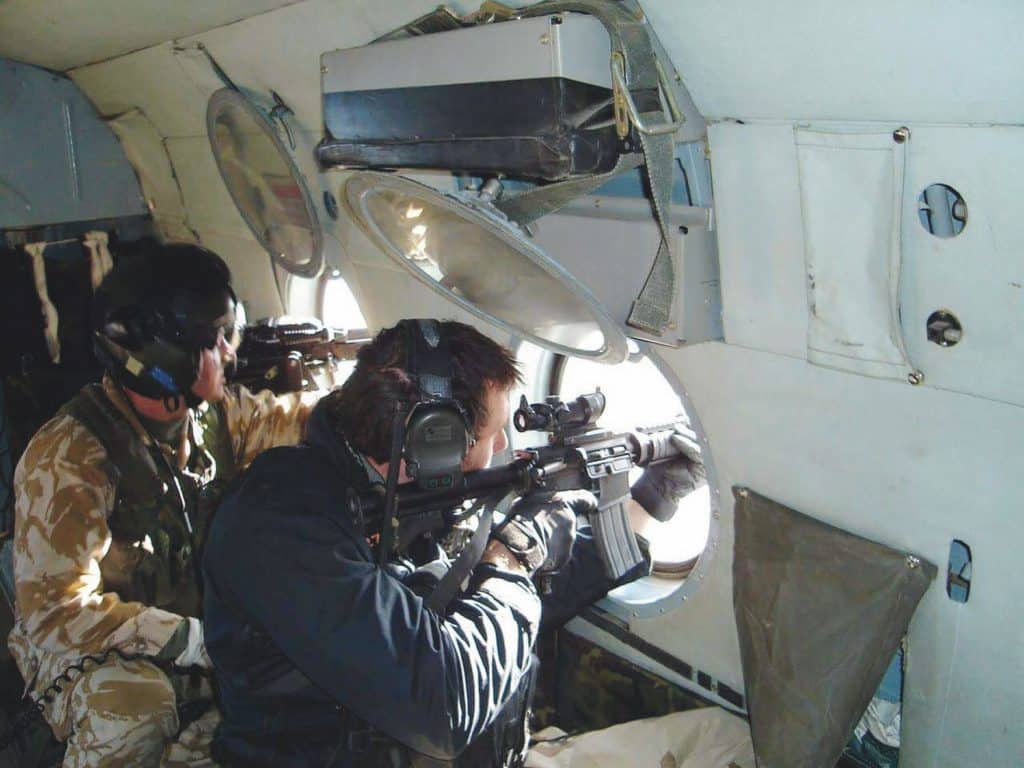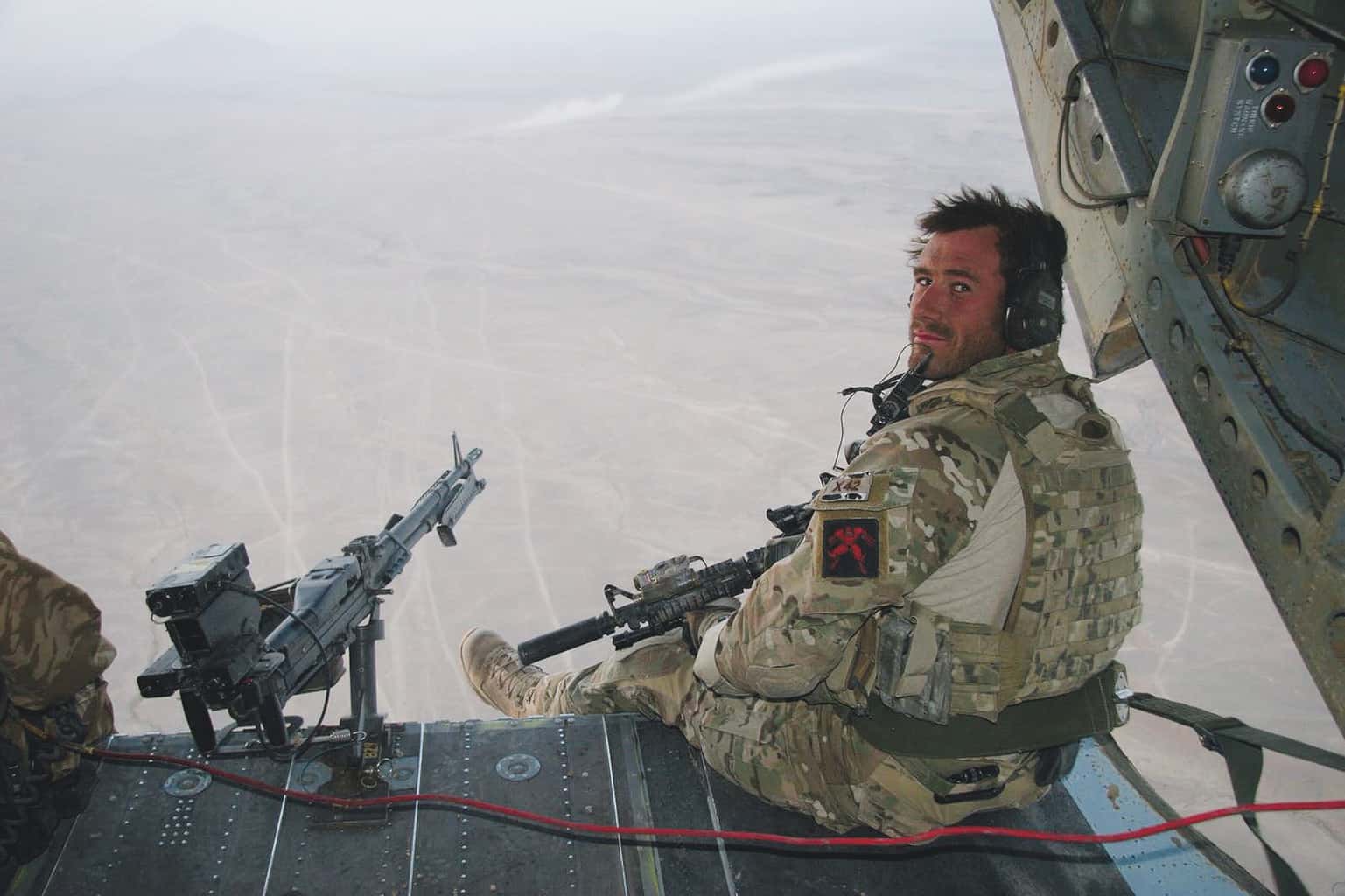With Remembrance Day having just passed, we’re reminded of those who fought for their country and lost their lives, and the stark reality of the bloody battles that have afforded us our freedom.
One man who’s all too familiar with that world is Jason Fox. A former Royal Marine who went on to serve in the military elite of the Special Boat Service, where alongside the very best in the world he planned and led dangerous operations including hostage rescue, counter-terrorism and counter-insurgency.
Off the back of his hugely successful documentary series The Real Narcos, Jason has just written his military memoir, Battle Scars, where the realities of his time in service are laid bare. Writing candidly about his brushes with death and the huge cumulative psychological effect all those high stakes missions had on his mental health.
We spoke to Jason about his time in the military, the PTSD he didn’t want to believe in and how he battled those issues to become a happier, healthier version of himself.
The MALESTROM: Your book, Battle Scars, certainly doesn’t glorify war. Was that a conscious decision from the outset?
Jason Fox: Yes definitely. I enjoyed being a soldier, but I don’t think there’s any glory in the whole war thing. It’s something that has to get done, it’s a job I suppose. People go into it for lots of different reasons, not necessarily for the glory of war, in my experience never.
To be honest, the war sections are just scene-setters to make you understand I went through a stressful period and it had an impact on me. It could have been written by someone in any industry, they’re the bits that need to be brought to life so there was a meaning to why I was on that journey.
TM: What initially drove you to go into the marines at 16 and then ten years later the elite military?
JF: Well I joined the Marines at 16 because I grew up in Luton (laughs). There was that, but I didn’t do that great at school, in fact, I was rubbish at school. I was more an outdoors person, practical, I wanted to get out and challenge myself. And my Dad was in the Marines years and years ago, so there was obviously that influence as well.

TM: Was he the inspiration for it then? Wanting to prove something to him?
JF: Yeah. I think I would have gone into the military, but obviously, with my Dad having been in the Marines, that just seemed like a natural thing to do. I went to the careers office and went straight up to the Royal Marine in there and that’s who I spoke to.
TM: How affecting was the training? Did it come easily to you?
JF: No it didn’t, not at first. I’d trained quite hard physically, but it was more the fact I was 16 and I’d been at home the whole time with my parents. So the hardest thing for me was actually looking after myself, being able to administer my time and also all the little mundane bits like cleaning clothes and ironing them, I found that really tough.
It was psychologically hard being on time for something. I’d never really had to be on time, there was getting to school and that was it. So it was all the real growing up stuff that I found hard. The physical side and the soldiering were fine, it was looking after myself where I struggled, I got there in the end, but that’s the stuff that sticks out in my mind.

TM: The first sequence in the book is particularly gripping. Have you had many moments in action when you’ve thought this might be it?
JF: There’s been quite a lot, I mean having done multiple tours sometimes your fighting on average every other night. That was the one that seemed to stick in my mind the most. It was on the last tour I did, it was hardcore and everyone that was involved on that night we still talk about it because we’d just got into the country as well, so it was a shock to the system.
TM: Most blokes will never experience real warfare. What’s that feeling like to wait for a Chinook helicopter to pick you up when under enemy fire? It must be terrifying but also quite the adrenalin rush?
JF: It’s an awesome adrenalin rush, that’s the confusing part about it. You’re petrified but you’re loving it. The adrenaline is telling you to love it, it’s feeding into you, that’s the bit that becomes addictive. It sounds bizarre, but I think there are a few other things that go in hand with that, the fact that you’ve got a bunch of people around you that you can rely on. When you’re away from it you don’t miss getting shot at, you miss the adrenaline and the people around you that you can trust.

TM: The way Battle Scars is written is interesting, without giving too much away, say the incident when your hiding in the ditch, yearning for home and to be with your Mum. It definitely doesn’t feel like a typical book about war, because it isn’t…
JF: That was a shock to me to be honest because it hadn’t really happened before. I was too wrapped up in what I was actually doing. That was definitely one of the first times, there wasn’t anything mega different on that tour that was different to others, it was the straw that broke the camel’s back I suppose.


TM: You write early on in the book about finding it easy to zone out on operations – was that a coping mechanism to get through what you were seeing?
JF: Yeah probably. Your mind normalises everything for you, so it’s not really an issue. It was easy to zone out, but it got harder as the years went on because obviously, the infrastructure improved, social media got bigger. You were too contactable with the life back home which sounds great, it’s what we always wanted and then when we got it we wished we didn’t have it. Because all the stresses and strains from home life creep into the war fighting stresses and strains and it’s not really a good mix.
TM: That must have changed things quite a lot, the introduction of tech & social media, the routine at bases must have been very different compared to the old school letter from home?
JF: Yeah, you get the odd letter from back home the next minute you’re flying around on Plenty of Fish. It’s mad. That’s an example of other people by the way, not me (laughs).
TM: How easy is it to switch from Foxy the commando to Jason Fox the family man?
JF: I thought I found it easy to switch to begin with. It seemed easy enough, then I suppose looking back it wasn’t. But then coming back from that last tour was difficult, because without knowing it I’d probably had too much. I was a bit detached and when I looked at the next tour looming in the distance and thought about getting ready for another one, I wasn’t looking forward to it.
I was having a drama with coming back home and then I was also having a drama with thinking about going away again. Nothing seemed fun or like anything to look forward to.
TM: One big factor seemed to be humour even after your life had just been in grave danger…
JF: It’s probably one of the most important things. It naturally happens, it’s not like you go out of your way to have a joke or else everyone’s going to be depressed. It just happens, it’s a naturally occurring thing. Especially with us Brits, we’re renowned for it.
TM: There’s one story in your book about that 24-hour gun battle in the desert. That sounded beyond comprehension…
JF: It was sort of sporadic throughout the day. It was like an emotional rollercoaster, your up and down, your on a high with the adrenaline flowing, your down in the baking sun and something kicks off again, or something happens where you think its kicked off and it hasn’t. It’s mad, it’s constant toing and froing, just general confusion. I mean it’s good and it’s bad.

TM: You talk about the stress you had to deal with being best dealt with alone – how hard was it to process what you saw?
JF: It wasn’t so much what I saw, I wasn’t too fussed about that. I think it was being under the constant stress and worry of getting really badly injured or dying. It wasn’t really what we were doing or what we saw it was more about that stress. Just like, “f**king hell we’re going out again, am I going to lose a leg? Am I going to get shot? Am I going to be in immense pain?” It’s that fear that just chips away at you, constantly being in that zone where you’re wondering whether you’re going to die I suppose.
TM: You didn’t really believe in PTSD, certainly not the term itself…
JF: Well I’d been involved in lots of things prior and I’d always been alright, so I didn’t really believe it was something that was real. Then obviously it was, it showed itself in me. I had to come to terms with all that, being someone who shunned it, then the next thing I know I’m wondering why I’m feeling a bit different and I have to come to terms with that.
TM: You talk about what people know to be post-traumatic stress being very different from the Hollywood version people see…
JF: Yeah, it didn’t manifest like that at all. Essentially I’d lost my love for the job which was really upsetting because I did love it. The next tour that I’d have normally looked forward to was just a black cloud looming in the distance. I wasn’t having flashbacks or diving for cover, it was just a case of losing my mojo for it all.

TM: You said your version was more detached & indifferent – similar to a kind of extreme grief…
JF: Yeah I suppose it must be. Your just sort of numb to everything which isn’t a good thing. It’s not exciting either if you’re numb to all the stuff going on around you, it’s just boring.
TM: What advice would you give to others in the forces who are suffering from similar issues?
JF: I’d say definitely go out there and actively look for someone you can talk to that you can engage with. It might not be the first person you meet but at least your exploring the options to try and fix yourself.
Before that, you just need to be honest with yourself. If you really want to get yourself out of a rut you have to first be honest and admit there’s something that needs fixing, which is a good thing and then go out on that journey and find what it is to get in the right headspace.
TM: Is it less of a stigma now in the military?
JF: Yes definitely so. There’s always going to be a little bit there, but the more it’s brought up, the more we talk about it the less there will be. If more people talk about it then obviously there will be less stigma because people are saying “I”ve suffered from it”.
The stigma comes from people not saying anything and it being the unknown. The stigma is probably self-inflicted. The number of people who say, “sorry I didn’t want to bother anyone”, or “I thought it was just me”. That’s a self-inflicted stigma because once you start talking about it everyone’s like “it was good that you brought that up and you’re on the mend”. It’s the bit beforehand that’s difficult.

TM: What was it that helped you most? Was it the talking? In the book, you mention practicing mindfulness…
JF: The talking was good and I did end up doing a bit of mindfulness. I went off with a hippy therapist and did more in the now stuff. Being honest with myself, that was the biggest thing, so stopping pretending to be someone else, stop pretending to be not you.
Then there was the mindfulness, living in the moment, don’t keep dwelling in the past, because the past has happened and you ain’t changing it and don’t worry about the future too much cause you’re worried about something that hasn’t happened. So still have plans, still have deadlines, all the important adult things, but spend a bit more time in the now as well.
TM: Was it hard reliving all these missions and difficult moments in your life for the purpose of the book?
JF: It wasn’t so much doing the book that was hard. It was hard reading it, seeing it in black and white. Some bits were a bit wincy and I felt a little bit uncomfortable about it, but I suppose that was a good thing, that’s why I left it in.
TM: What about the reaction from the ‘Brotherhood’. Has that been positive?
JF: It’s been all good so far. There were some lads that I was worried about because everyone’s critical, it’s a hard bunch to please and yeah, it’s been quite good.
TM: What do you miss most?
JF: Just the lads really. I mean you used to do a lot of cool stuff, but there’s a lot of bullshit that goes with the cool stuff, so all up it’s the lads. It’s not like they’ve gone anywhere, they’re still there, still my mates, it’s just having the lads in the work environment can be fun. It can be f**king tedious as well, but on the whole, it’s fun and it’s what gets you through the dark times when you’re away to be honest.
TM: We can’t not mention The Real Narcos. That was an amazing series. What were the sketchiest moments you had making that?
JF: There was a few. The interviews we did with the guys with the masks on, the skull masks in the cartel. He was quite high up, that was really sketchy. The first hour of that meet we were all trying to assess whether it was safe, including them, trying to work out whether we could trust each other.
The way they did that was just by shoveling more gear up their noses, so that made it even worse. They were all armed and they let us know what the score was from the beginning, that if we f**cked around they were going to take us out to the desert and bury us. So that made us switch on quite a bit, that was a sketchy moment.
We came across a body, there were sketchy moments through all of it, all the bits that looked sketchy on TV were just that. We were in Columbia in that little shack with a smuggler, legging it from the cocaine chefs shack and getting chased, there was enough sketchiness going on, it was good.

TM: What backup did you have out there?
JF: None really. If you think about it, those countries are dominated by the cartels, your backup could exhaust itself and you’re still f**ked anyway because you’re in a bit of a dodgy country. So your better off going in with a persona that’s not in their face, sort of submissive in a weird way. It’s about engaging, relationship building really.
Actually, it was quite a good challenge, instead of knowing if there was an incident you could call in air support and give it large, it was another thing you had to learn. Keeping it sweet.
TM: Have you got plans to do more?
JF: Yeah, I think there’s some stuff in development. So hopefully there will be more to come.
TM: Going back to the book. Has writing it been a healing experience for you? Did you feel good after completing it?
JF: Yeah, definitely. I mean at the end of the day, after recounting stuff I’d have a fuzzy head. I’d just need a beer or something. But once I got into the swing of it and once it was signed off and everything, you could then sort of enjoy what happened. It was worthwhile doing it, from my point of view anyway.
TM: We always like to finish by asking for some wisdom can you give us?
JF: The one thing for me now, I don’t care about anything other than having a laugh. There will be things that get you down, but just try and bring it back to having a laugh because it makes you feel good.
Battle Scars: A Story of War and All That Follows is out to buy now.
Click the banner to share on Facebook




